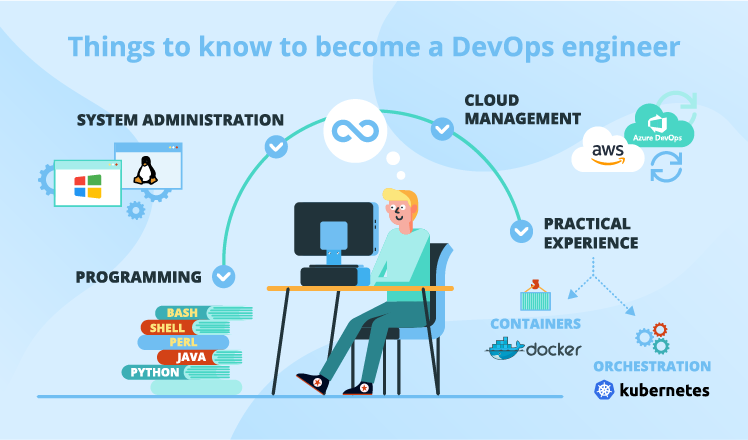 There is no doubt that working as a DevOps Engineer can be a fascinating and rewarding career, but how do you get started and then stay on track?
There is no doubt that working as a DevOps Engineer can be a fascinating and rewarding career, but how do you get started and then stay on track?
The first thing you need to do is understand what DevOps is if you want to get involved. DevOps is not a product or a single skill; it is a methodology for effectively achieving a goal. It is the amalgamation of tools and processes that facilitate communication and collaboration to deliver the right results with a lean and agile approach. Working in the DevOps environment needs skills, adaptability, initiative, and innovation. These attitudes require the support of the technical knowhow for understanding containers, storage, networking, automation, and configuration control.
This definition suggests that the term DevOps Engineer is a misnomer, how can you engineer an idea or a philosophy. Well, that may be true, but it does not take away the fact that DevOps is a fantastic opportunity that needs professionals to turn the ideas into reality. People who can facilitate the collaboration of code developers and other IT professionals and manage the automation of the process of application delivery and infrastructure integration. They help the various specialist teams work together so that they can as a whole deliver quicker and better solutions through a continuous process with a built-in feedback loop for process improvement. The focus for effectively working should be on small changes that require minimal manual intervention to deploy for a maximized iterative development process. DevOps is all about evolution, not revolution.
The DevOps Engineer career path has been around for less than ten years, so it is still evolving, but being at the cutting edge of development and deployment is its greatest attraction. To become a DevOps Engineer needs the right balance of knowledge, experience, and mindset.
For any organization to successfully embrace the DevOps philosophy, their DevOps specialists must have the skills to communicate effectively across a broad range of stakeholders, from the developers to the integrators to the management to the sales team. They need to hurdle the barriers that are placed in their way and convince everyone to work together towards a common goal. Sometimes being a DevOps professional is more about diplomatic skills than technical skills. The best DevOps professionals thrive on conjuring up solutions for other people’s problems, masters at spotting where processes can be automated. Ultimately, the senior DevOps engineer may well find themselves influencing board-level decisions and driving corporate change.
DevOps Engineers are developers, managing the design, implementation, and maintenance of code-based solutions in collaborative environments. DevOps Engineers are familiar with containerization, and continuous integration builds and the automation of administrative functions. DevOps Engineers are also system engineers, familiar with tiered architectures. DevOps Engineers are cloud solution specialists, an expert at hosting and migration processes.
DevOps Engineers and Development
While you may not need to be an expert code writer, knowing the principles and processes of code writing is essential. Especially when it comes to knowing how to write code that is verifiable, maintainable, and portable. The theory of DevOps is all about simple reuse of proven functions to manage the continuous integration approach with a right-first-time attitude.
DevOps Engineers and Containers
Containers are still the most popular solution for commercial enterprises to develop and deploy applications. News of their replacement by serverless applications is greatly exaggerated, this may be a future trend, but right now, it is not a commercial reality. Containers are an essential tool for DevOps Engineers looking to manage a continuous integration build process.
DevOps Engineers and System Engineering
For DevOps to be successful, the DevOps Engineer must understand how the components in the finalized solution integrate to work successfully together. From the operating systems to the middleware, applications to networks, deployments are only successful if all the parts fit together correctly and leave no functionality gaps. Understanding how the presentation tier, application tier, and data tier interact in the client-server architecture is key to making things work as planned. All these factors link with configuration management, understanding all the interactions that are necessary to know how their correct configuration.
DevOps Engineers and the Cloud
Working in a cloud environment is now the norm; on-premise solutions tend to be the reserve of niche solutions with specific requirements that do not lend themselves for cloud deployment. Many commercial enterprises have moved across the using Azure, AWS, or one of the other off the shelf solutions available. It is a rare breed of DevOps Engineer that does not need cloud awareness these days, let alone practical experience of working in a cloud environment. Becoming certified for a cloud hosting environment is a recommended step. Certification options include Google DevOps engineer and AWS DevOps engineer, as both AWS Cloud and Google Cloud are both popular solutions; it would not hurt for a DevOps Engineer to go for both. The beauty of DevOps is the ease of being able to easily switch hosting environments if it is advantageous to do so.
DevOps and Continuous Improvement
The deployment of an application into its production environment is not the end of the DevOps process. Deployed applications generate operating logs, alerts, and audit records. The developers, the operations team, and the security team use this data to monitor, troubleshoot, and audit the applications and the host infrastructure. DevOps Engineers need to know how to navigate and interpret this data, troubleshooting issues, and initiating corrective action.

DevOps as a Career
If you are looking for a new career path, then looking at market demand and future potential are always good indicators of which is the right way to turn. The attraction of Cloud Services and the growth of the solutions that utilize the DevOps philosophy indicate that the future of DevOps is indeed bright. If you are eager to learn, technologically curious, and enthusiastic about working in a broad range of environments using the latest tools, techniques, and skills, then a career in DevOps could well be what you are seeking. As companies are inclining towards cloud networking, the demand for DevOps is growing daily thanks to the active collaboration between DevOps and the Cloud.
by Stephen M.